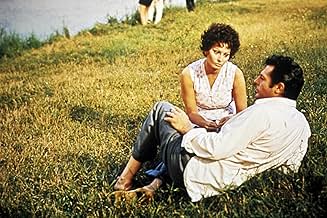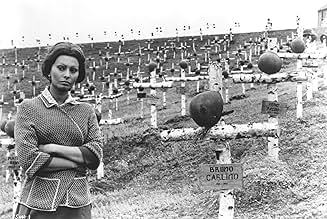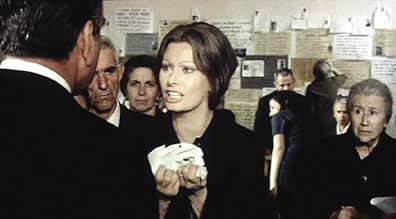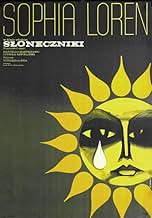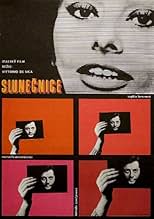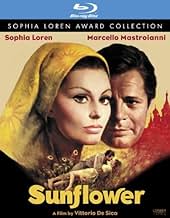NOTE IMDb
7,3/10
4,9 k
MA NOTE
Une femme italienne mène une recherche désespérée pour retrouver son mari, un soldat porté disparu au combat en Russie pendant la Seconde Guerre mondiale.Une femme italienne mène une recherche désespérée pour retrouver son mari, un soldat porté disparu au combat en Russie pendant la Seconde Guerre mondiale.Une femme italienne mène une recherche désespérée pour retrouver son mari, un soldat porté disparu au combat en Russie pendant la Seconde Guerre mondiale.
- Réalisation
- Scénario
- Casting principal
- Nommé pour 1 Oscar
- 1 victoire et 2 nominations au total
Lyudmila Saveleva
- Mascia
- (as Ljudmila Saveljeva)
Nadya Serednichenko
- Contadina russa
- (as Nadja Cerednicenko)
Gunars Cilinskis
- Funzionario russo
- (as Gunnar Zilinskij)
Carlo Ponti Jr.
- Giovanna's Baby
- (non crédité)
Mariya Sapozhnikova
- Passerby
- (non crédité)
Avis à la une
"I Girasoli" is certainly one of the best romantic stories in an honest and pure setting in Italy and Russia. It is a dramatic love story of Antonio and Giovana wanting to stay together in the war. The impossibility to hold on to the newly found and sweetest happiness becomes inevitable in the destructive war, where Anoinio is found half frozen by a Russian woman. The accent lies in finding love in warm sunny Italy and loosing this in the freezing cold war thousands of miles away. Although in this new other world there is love too, it is never the same as before. At the end the search for the lost love is completed and in vain when life has changed there lives irreversibly. Un impossibile ritorno al passato.
Vittorio de Sica achieved a remarkable feat in this eye-catching 1970 production, bringing together Americans and Soviets, in the midst of the Cold War, in the co-production of a Franco-Italian film.
From the Americans he got a memorable soundtrack, written and directed by Henry Mancini and nominated for an Oscar. From the Soviets he received the footage from Mosfilm, directed by Andrey Konchalovskiy, as well as the actress Ludmila Saveleva.
The script by Tonino Guerra and Cesare Zavattini has everything it needs to work, but the film gets lost somewhere in between so many attributes.
The story is basic and excessively melodramatic. The soundtrack is beautiful but quickly becomes cloying. The footage of the sunflower fields and the cemeteries of Russian combatants is powerful and eloquent, but inconsequential. This is, after all, a story of the living, not the dead. Only the final notes of the fatalism of war, which determines people's fates, far beyond their individual will, remain to give the film any meaning.
But it is not enough. A final result clearly less than the sum of its parts.
From the Americans he got a memorable soundtrack, written and directed by Henry Mancini and nominated for an Oscar. From the Soviets he received the footage from Mosfilm, directed by Andrey Konchalovskiy, as well as the actress Ludmila Saveleva.
The script by Tonino Guerra and Cesare Zavattini has everything it needs to work, but the film gets lost somewhere in between so many attributes.
The story is basic and excessively melodramatic. The soundtrack is beautiful but quickly becomes cloying. The footage of the sunflower fields and the cemeteries of Russian combatants is powerful and eloquent, but inconsequential. This is, after all, a story of the living, not the dead. Only the final notes of the fatalism of war, which determines people's fates, far beyond their individual will, remain to give the film any meaning.
But it is not enough. A final result clearly less than the sum of its parts.
I went to a san francisco theatre to see this film along with my mother when I was a teenager in the 60's. It was in english and I loved it so much I saw it twice. I never forgot it, and although it was never shown again, I was told by someone a few years ago, that it was featured on one of the cable channels, and unfortunately I must have missed it. I don't think its ever been shown since. In my humble opinion, this classic movie depicting love, war, passion, separation, hope, and tears should be rated right up there along with Dr. Zhivago, Casablanca, In Love and War, and many other great films of all time. It's a pity that this movie "Sunflower" is nowhere to be found on video or better yet DVD in the english version in the U.S. I did purchase it on video in Italian, and even though I am fluent in Italian and can understand it, others in my household cannot. Can somebody PLEASE see that it gets some recognition, and becomes a familiar movie and available here in the U.S.A.?
You know the plot.
Sunflower was Vittorio De Sica's last film. It was dismissed by the critics as hopelessly maudlin melodrama. But anyone who cares enough to be reading this no doubt knows the humanity he crafted into every frame, and the beauty and sadness of life it evokes.
Henry Mancini's theme song is, IMVHO, the very best he ever wrote. I'm reduced to tears every time I hear it. Yet it seems Mancini himself treated as a lesser child. His daughter recorded it to lyrics better left forgotten.
Sunflower was Vittorio De Sica's last film. It was dismissed by the critics as hopelessly maudlin melodrama. But anyone who cares enough to be reading this no doubt knows the humanity he crafted into every frame, and the beauty and sadness of life it evokes.
Henry Mancini's theme song is, IMVHO, the very best he ever wrote. I'm reduced to tears every time I hear it. Yet it seems Mancini himself treated as a lesser child. His daughter recorded it to lyrics better left forgotten.
I suppose this film is just a maudlin melodrama, so is the music by Mancini. But then..., what a marvelous maudlin melodrama!... Why shouldn't it be? what's wrong with maudlin melodramas? If they are well done and authentic with their characters, if we get wrapped up with their emotions..., well, can you ask for anything more?
I just saw this movie on "You Tube" for the second time. I remember seen it on late TV in Italy, many years ago, and the impression was so powerful that after somebody mentioned it a few days ago --I didn't remember any more this title until they mentioned it-- I decided to look for it and watch it again, to see after so many years if the impression was still the same (so many films are a total disappointment when seen for a second time years later), but it wasn't the case with this one.
The story is so poignant that it can hold on its own very well no matter the change in mores and film technical improvements, it definitely grabs your interest till the very end (I must admit the film is far from perfect, since, for example, there are no indications of how many years went by or the new life style Sophia's character turns to after her Russian trip.
It also has two climaxes, both marvelous, but I think they should have decided for one or the other, two climaxes is too much within the same movie, and the length should have been shortened quite a bit.
Anyhow, forget about the lachrymose side of the story and submerge yourself in it (also get some Kleenex handy because everybody will need them, and plenty) and if you have to have a good cry, well, have it and enjoy it!! (After all is just a movie).
I just saw this movie on "You Tube" for the second time. I remember seen it on late TV in Italy, many years ago, and the impression was so powerful that after somebody mentioned it a few days ago --I didn't remember any more this title until they mentioned it-- I decided to look for it and watch it again, to see after so many years if the impression was still the same (so many films are a total disappointment when seen for a second time years later), but it wasn't the case with this one.
The story is so poignant that it can hold on its own very well no matter the change in mores and film technical improvements, it definitely grabs your interest till the very end (I must admit the film is far from perfect, since, for example, there are no indications of how many years went by or the new life style Sophia's character turns to after her Russian trip.
It also has two climaxes, both marvelous, but I think they should have decided for one or the other, two climaxes is too much within the same movie, and the length should have been shortened quite a bit.
Anyhow, forget about the lachrymose side of the story and submerge yourself in it (also get some Kleenex handy because everybody will need them, and plenty) and if you have to have a good cry, well, have it and enjoy it!! (After all is just a movie).
Le saviez-vous
- AnecdotesThe child of Giovanna (Sophia Loren) in this film was actually Loren's from her partnership with producer Carlo Ponti.
- GaffesMascia tells Giovanna that when she found Antonio, he was hurt so badly that he had forgotten everything, including his own name. If that's true, then how did Mascia know his name was Antonio?
- ConnexionsEdited into Marcello, una vita dolce (2006)
Meilleurs choix
Connectez-vous pour évaluer et suivre la liste de favoris afin de recevoir des recommandations personnalisées
- How long is Sunflower?Alimenté par Alexa
Détails
- Durée1 heure 47 minutes
- Mixage
- Rapport de forme
- 1.85 : 1
Contribuer à cette page
Suggérer une modification ou ajouter du contenu manquant

Lacune principale
What is the Mexican Spanish language plot outline for Les fleurs du soleil (1970)?
Répondre

